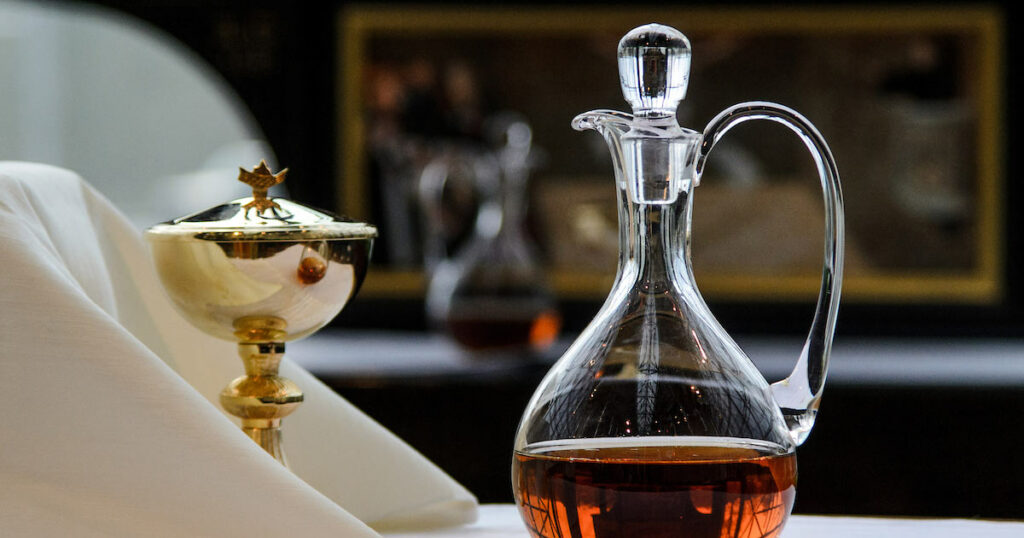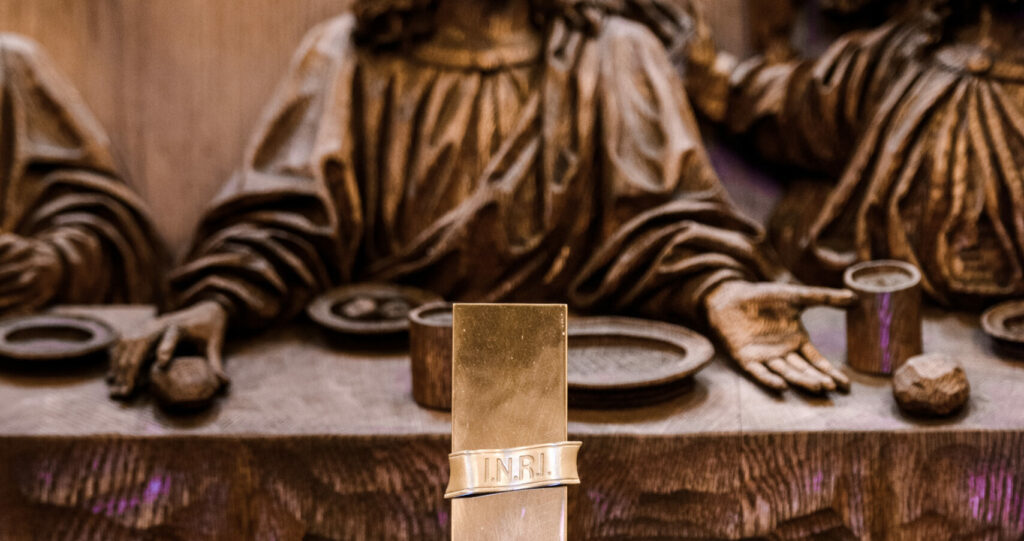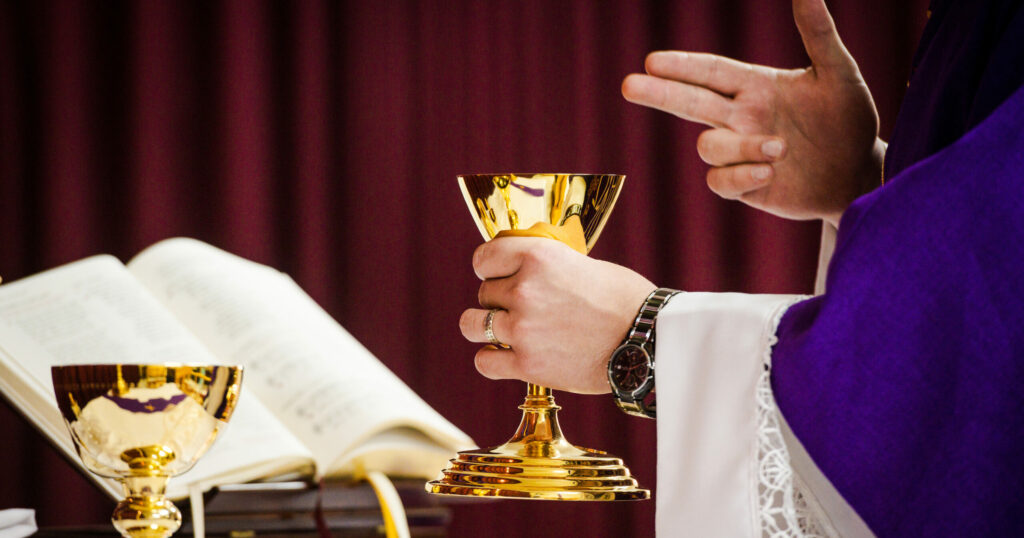The first article in a series on weekly communion.
Weekly communion was not widely practiced for a significant part of the twentieth century in The Lutheran Church—Missouri Synod (LCMS). In recent decades, however, scores of LCMS congregations have restored weekly communion. Such practices may appear fanatical. Some may pridefully say, “Look how often we do it,” while for others, objections may quickly surface: “Why should we have to do it every week?”
One great error of the Roman Catholic Church perverts the Sacrament into something done by man, an un-bloody re-sacrifice by the priest. One great error of Protestants distorts the Sacrament into something done by man, a symbolical act of remembrance and obedience. Lutherans do not commit the errors of Rome or the rationalizing of the Protestants. But questions that take the Sacrament as something we do unwittingly and harmfully distort the action and direction of this holy gift.
The living Christ, here and now, in the flesh, does this. It is His doing, not ours.
The Lutheran Confessions identify the nature of both the Roman Catholic and Protestant errors as fanatical because they speak of the Lord’s Supper as something that we do. Dr. Luther narrows in on this in the Large Catechism: “Nearly all the fanatical spirits … regard the Sacraments, aside from the Word of God, as something that we do” (LC V 7). “Aside from the Word of God” means “apart from.” Luther was combatting Zwingli and other Protestants who treated the Sacrament as our human act and denied the gracious promises God connects to it. Luther’s reasoning here is closely related to Article V of the Augsburg Confession, which confesses that God is not known apart from His Word.
Our sinful default setting focuses first on our own actions; this pertains also to the Lord’s Supper. Keeping this in mind, Lutherans do not disconnect Holy Communion from Christ’s Holy Word. They do not follow Zwingli’s error of denying the forgiveness of sins and the other blessings Christ gives in this Sacrament. Even so, we are constantly tempted to take over the verbs of Scripture and treat God’s gifts as our work. We rebels long to be in control. When we view the Sacrament as our doing, we are being fanatical.
Christ-centered questions
The Scriptures confess that the Sacrament is what Christ does for us. Questions about the Sacrament, therefore, are rightly expressed with Him as the subject — the “doer” — of the verbs, not us:
- Why should the living Christ visit sinners like us in such a personal (“for you”) and marvelous way?
- Why should the living Christ have opportunity to do this for His gathered guests each Lord’s Day?
This perspective profoundly differs from “our doing” the Sacrament. This perspective is foundational for the recovery of weekly Communion.
Answers to questions about our actions turn us in on ourselves, our habits, our felt needs of the moment. When I was confirmed in the 1960s, my home congregation served the Sacrament four times a year. With that foundation, the faulty question “Why should we do it each month?” could have replaced the faulty question “Why should we do it each week?”
Our Lutheran Confessions’ warning against treating the Lord’s Supper as something we do is a loving warning. Answers to Christ-centered questions explode with beauty and blessing beyond all earthly limits. Scriptural answers show the beating heart of the Divine Service and are full of “life and salvation.” In the Lord’s Supper “we speak of the presence of the living Christ, for we know that ‘death no longer has dominion over Him’ [Rom. 6:9]” (Ap X 57). Thus, what Lutherans confess from Scripture concerning Holy Communion might be summarized this way: The living Christ, here and now, in the flesh, does this. It is His doing, not ours.
Jesus’ great gift
Of all the beautiful acts Jesus did, this is the ultimate gift He gave His church before stepping out into the night on Maundy Thursday. He taught them much in the preceding three years. He did many miracles and signs of feeding, healing and rescue in their presence. Then He set His face toward Jerusalem.
His incarnation, His holy birth, His submission to His parents, His Baptism in the Jordan, His years of visible earthly ministry, all led to the upper room. There at Passover, He prayed high and priestly prayers. He humbly washed dirty feet. Then, He gave His gifts. As He moved steadily to the cross, He bequeathed to His Bride the means by which she would receive forgiveness, His soon-to-be-sacrificed body and blood.
This was His great gift to His gathered disciples and, by extension, to His church before His walk to Gethsemane. Then came the center of human history, the greatest gift of all, His once-for-all sacrifice for the sin of the world. His sacrifice was followed by His open, empty tomb and bodily resurrection to new life for us. Alleluia! Christ is risen! He is risen indeed! Alleluia! Now, He intercedes for us as both God and man and continues His ministry to us as both God and man, with all authority in heaven and on earth — that is, at God’s right hand.
Each Lord’s Day
“Why should the living Christ give this gift for His gathered guests each Lord’s Day?” To unite bodily with His Bride with all the authority in heaven and earth. The living Christ, here and now, in the flesh, does this. He continues the teaching and doing that He did in His earthly ministry (Luke 24:50–53; Acts 1:1–11). He does not teach and act today in some spiritualized, “wispy” manner. Rather, “Jesus Christ has come in the flesh” (1 John 4:2), and continues to teach and act in physical, “fleshy” ways. How wondrous! Jesus, the God-man, still ministers in the flesh for us.
The third stanza of Luther’s Commandment hymn reinforces this truth about Sabbath Day worship. Concerning the day of rest, he writes, “and put aside the work you do, So that God may work in you” (LSB 581:4). Luther’s words apply to the preaching Christ does for His gathered church (Rom. 10:17; Luke 10:16). Surely, they also apply to Christ serving His church His holy food. The question “Why should the living Christ come to serve us this wondrous and forgiving gift?” is answered by Luther’s Sabbath Day hymn, “so that God may work in you.”
“In My remembrance”
What about Jesus’ words (Luke 22:19–20) and those of St. Paul (1 Cor. 11:24–25): “Do this in remembrance of me”? This could be translated, “You all keep on doing this in my remembrance.” The context of the Last Supper and of God’s revelation to St. Paul is important. Those in the upper room were apostles (“sent ones”), as was St. Paul. Jesus sent them to be stewards or house managers of the mysteries of God (1 Cor. 4:1–2), and they were to continue setting forth this gift of Christ’s ongoing ministry to His people. Luther similarly taught pastors who were hesitant in celebrating Holy Communion. He made clear that the Lord’s Supper should be celebrated once or twice on Sundays and during the week, if desired. If pastors had reservations or felt unworthy of this, Luther wrote, “I would tell them that no one compels them except God himself through his call. For since they have the office, they are already obliged and compelled to administer the sacrament when it is requested of them; thus, their excuses are void” (LW 49:207).
When Jesus said “keep on doing this in my remembrance,” He wasn’t speaking primarily about recalling past history. Rather, He spoke of active remembrance, of receiving in faith the benefits He serves us (AC XXIV 30–32). This is not a conscious activity, a mere mental capacity. Rather, it is recognizing and receiving in faith what Jesus does in His forgiving, life-giving capacity. God is remembering His promise in Christ as Christ serves us. Our remembering is receiving in faith what He is present to give us now from His saving work on Calvary.
God is remembering His promise in Christ as Christ serves us.
The Holy Spirit declared Jesus’ ongoing sacramental doing on Pentecost. He led the infant church in devotion to the apostles’ teaching and to the Lord’s Supper (Acts 2:42). The word translated “devoted to” reveals that the laity were obstinate and immovable in their reception of both Word and Sacrament. They kept on receiving what Jesus came among them to do. The prayers — the ordered worship — and the fellowship of the post-Pentecost church were formed by the ongoing ministry of the risen Christ. He continued to speak His Word and serve His Sacrament to them through His sent ones. The living Christ, there and then, in the flesh, was doing that.
The Lord of the Sabbath (Matt. 12:8) remains among us as One who serves at His Table (Luke 22:27; see also Matt. 18:20; 20:28). It is not fanatical to desire His loving and wondrous gift each Lord’s Day. “Why should He visit sinners like us in such a personal (‘for you’) and marvelous way?” Because He loves to give life and light, healing and strength, forgiveness and rest, unity and faith, hope and love, and peace that passes all understanding. Indeed, the holy mystery of His body to eat and His blood to drink passes all understanding. The magnificent truth foundational to this holy mystery is this: The living Christ, here and now, in the flesh, does this.





When I was younger, I remember it being twice as year, then it became quarterly, then monthly, then weekly, then started including Wednesday weekly services, this was in a Missouri Synod.
Personally I now take once a year, at the time our Lord’s death and resurrection occur, I look forward to this time, it makes me become focused on what he did for me!
Every week in the Divine Service you are supposed to remember and celebrate Christ’s death and resurrection that was for you.
Why would you limit yourself to taking it once a year? That just seems counterintuitive to me.
How often dose the Lcms synod say the church should have the lords supper per month?
My wife’s simple summary in answer to these questions is my favorite. “When I get to Heaven if I’m asked why I believe what I do about the sacrament of Holy Communion, I want to be able to say ‘because you said’ instead of ‘I thought you meant'”. Says it all.
My family switched churches when I was 15. (Still LCMS). My dad was closer with our new pastor than at the previous church. My dad encouraged our pastor to push for weekly communion. It was received well by the rest of the congregation. That pastor is long gone with Jesus. For the last few of years they went back to every other week. I think this was merely because of low attendance. 🙁
Many things in scripture are not fully explained to our satisfaction, but God gave us what He believed we needed. I have to take it on faith that this is what He wants us to learn. I don’t question some things, others I
Do; being raised in a different faith, i just know that in many churches, scripture is fed to us piecemeal. When we are in His presence in Heaven, ask Him why he did or didn’t make everything crystal clear. Until then, I will take
It as it is, and if I never know? why, then I can accept that He knew we would question Him ; with so many translations, he could we not
If I was sick I surely have the common sense to quarantine myself from all people, although this COVID-19 orders from these medical experts have frightened people to the extent if you do not follow these orders, they say, “ you do not care about your neighbors “. All my life has been serving others, excluding my own needs were neglected even to harming myself most of the time. I have always for 86 years delight being in church, it is my life. I also believe the Sacraments is necessary for my life to love my Lord and others more and to deny myself as Christ modeled this before His Disciples before He was crucified for us all believers. My concern is I must wear a Mask, and the mask restrictions give me breathing difficulties. Private communion from my reading of God’s Holy Living Word is not the same as being together hearing the Living Word in my ears in communion as Christ presented to all the Disciples, even Judas, they were all together, it was all the Disciples.
Maybe it was the 90s, when I heard that the common cup was actually safer than individual cups, since the process of washing may fall short. I don’t claim to know, but the comment above regarding “spit” does show the humility of Christ, that He doesn’t shy away from our ‘contributions’.
Jesus plainly said, “Do this,” yet here is “a warning against treating the Lord’s Supper as something we do.” That might be puzzling.
Here are a few Bible verses that tell us what we do, reverently, in the Sacrament:
We bless the cup, we break the bread, and we partake. (1 Cor. 10:16, 17)
We take, we eat, we drink, and we remember. (Matt. 26:26-28)
We proclaim the Lord’s death until he comes. (1 Cor. 11:26)
So while indeed we do all those things, it is God who enables us and blesses us. The faith by which we can participate worthily, and all the benefits of participating, are entirely God’s doing.
“Every good gift and every perfect gift is from above.” (James 1:17a ESV)
As a pastor I’ve seen parishioners crave the Sacrament, especially as they near death. One of the blessings during these COVID days is that we’ve not only had every Sunday communion, but weekday communion services in order to provide smaller services to meet size of gathering restrictions. It’s the Body and Blood of Jesus, the medicine of immortality for body and soul. The great thing about being Lutheran is that we confess the Lord’s Supper as the Lord’s doing and the Lord’s gift to us. People are not to be coerced or forced to the table, but certainly encouraged to receive. I know as a pastor I definitely hunger and thirst for the Sacrament weekly, especially in these COVID days. I’ve had about all the ‘virtual’ church I can stand. It is a privilege and comfort to receive my Lord’s very Body and Blood and to know that He actually bids me to come.
Covid 19 is attacking the common cup. I struggle with individual cups. There are no plurals in the Greek to support many cups. There can be no sickness and disease in the blood of the Lamb. Human reason is our enemy! Am I crazy?
There is no scripture that promises no sickness or disease in the elements. To conclude there is no sickness or disease in the “blood” of Christ may be a valid rational deduction to what Scripture has revealed, we also know there is wine there and spit from folks who communed before. Any pastor knows this is true. So now its not just enough to judge our fellow Lutherans as to how “Lutheran” they are based on how “often” they come, but now we have to judge them on whether they use individual cups or the common cup? For crying out loud, do we really think Jesus cares about these things? If Jesus cared would he have not said every Sunday instead of “often” and make sure you use one cup to do it and this certain kind of bread and make sure it is done this or that. I was catechized that bread, wine, and Word make the sacrament — not the way it is distributed.
That question seems to point me in the direction of “magical thinking” – sort of like “black cats are evil” or “step on a crack, break your mother’s back” thinking. I prefer the Common Cup myself but I’ll receive Christ’s gifts in any manner He offers.